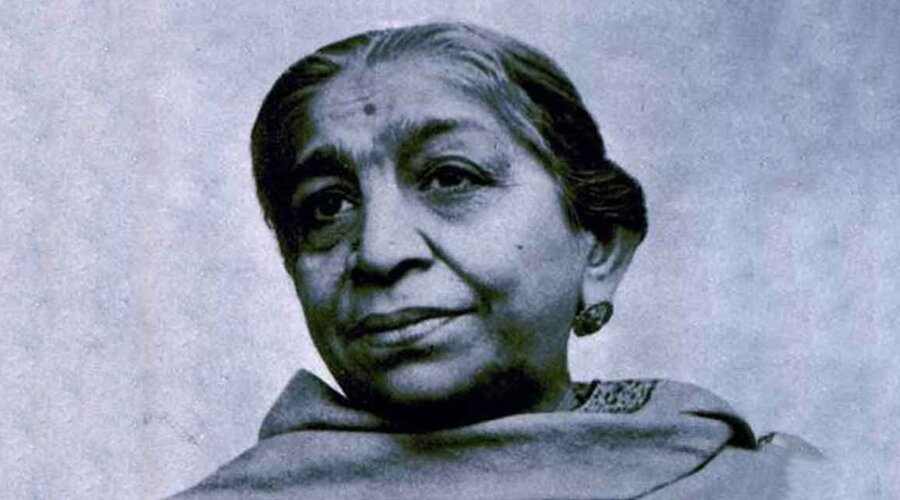Sarojini Naidu((13 February, 1879 – 2 March, 1949), popularly known as the Nightingale of India, was a multifaceted personality who was not only a celebrated poet, but also an accomplished politician, orator, and activist. She was a trailblazer who broke barriers in a male-dominated society and paved the way for future generations of Indian women to strive for excellence.
Early Life and Education:
Sarojini Naidu was born on February 13, 1879, in Hyderabad, India, to a Bengali father, Aghornath Chattopadhyay, and a South Indian mother, Barada Sundari Devi. She was the eldest of eight siblings and was raised in a family that valued education and literature.
Sarojini Naidu was an exceptional student and received her education at the University of Madras and Cambridge University.
Literary Career:
Sarojini Naidu’s literary career began at an early age, and she published her first collection of poems, “The Golden Threshold,” in 1905. Her poems were imbued with romanticism, patriotism, and a love for nature, and were well-received by readers and critics alike. Her subsequent collections, “The Bird of Time” and “The Broken Wing,” further cemented her reputation as a poet of exceptional talent and sensitivity.
Sarojini Naidu’s poems often celebrated the beauty of nature and the human experience, and reflected her keen observations of the world around her. Her poetry was infused with a sense of optimism and hope, and her verses often inspired her readers to dream and aspire for greatness.
Her most famous poem, “The Palanquin Bearers,” is a poignant and moving tribute to the courage and resilience of women.
Political Career:
Sarojini Naidu was a prominent figure in the Indian independence movement, and her oratorical skills and leadership qualities made her a force to be reckoned with. She worked closely with Mahatma Gandhi and other prominent leaders of the time, and played a pivotal role in organizing protests, boycotts, and other forms of civil disobedience against the British colonial regime.
Sarojini Naidu was also the first woman to be elected President of the Indian National Congress, and her political acumen and visionary leadership helped shape the course of Indian politics in the early 20th century. She was a staunch advocate for women’s rights and worked tirelessly to empower women and promote gender equality.
Legacy and Impact:
Sarojini Naidu’s legacy is one of resilience, courage, and unwavering commitment to the cause of social justice and equality. Her contributions to Indian literature and politics have inspired countless people, and her example has served as a beacon of hope for future generations of Indian women.
In recognition of her achievements, Sarojini Naidu was awarded the Kaisar-i-Hind Medal by the British government in 1917, and was later elected as the Governor of the Indian state of Uttar Pradesh. Her birthday, February 13, is celebrated as National Women’s Day in India, in honor of her contributions to the cause of women’s empowerment.
Literary and Political Accomplishments
Sarojini Naidu was also an accomplished musician and dancer. She was well-versed in Indian classical music and dance forms and often incorporated these art forms into her public speeches and performances. She was a patron of the arts and actively supported Indian musicians and artists.
Sarojini Naidu’s work as a diplomat also deserves recognition. She served as India’s first woman governor and was appointed as the Indian representative to the United Nations in 1947. Her contributions to Indian foreign policy and diplomacy helped to raise India’s profile on the world stage.
Despite facing discrimination and opposition due to her gender and ethnicity, Sarojini Naidu remained steadfast in her commitment to her ideals and principles. Her life and work continue to inspire women and marginalized communities to break free from the shackles of oppression and work towards a more just and equal society.
It is important to note that Sarojini Naidu was not without her flaws and limitations. As a member of the Indian National Congress, she did not fully support the rights of Muslims and other minority communities in India, which contributed to the fractious political climate that led to the Partition of India in 1947.
However, it is important to view her in the context of her times and recognize the immense impact she had on Indian society and culture. Sarojini Naidu’s legacy serves as a reminder of the power of individual action and the ability of one person to effect change in the world.
Conclusion:
Sarojini Naidu was a true pioneer who blazed a trail for Indian women in the fields of literature and politics. Her poetry, characterized by its beauty, sensitivity, and optimism, continues to inspire readers to this day, and her political legacy remains a source of inspiration for those fighting for social justice and equality.
The Nightingale of India will always be remembered as one of India’s greatest daughters and a true icon of women’s empowerment.
APNARAN TUMBLR SOCIAL MEDIA PLATFORM
READ MORE
- The Hidden Dangers of Tapeworm Infection
- Mahavir Jayanti: Celebrating the Life and Teachings of Lord Mahavir
- National Sport Day in India: Celebrating the Spirit of Sportsmanship
- Celebrating Meme Creators Day: Recognizing the Art and Humor of
- Mata Vaishno Devi: A Holy Pilgrimage Destination in India
- Ram Navami: Celebrating the Birth of Lord Rama
- Exploring the Significance and Legends of Kamakhya Temple in India
- RAMADAN: A HOLY MONTH OF FASTING AND SPIRITUAL REFLECTION
- Milkha Singh: The Story of India’s Greatest Track and Field Athlete

